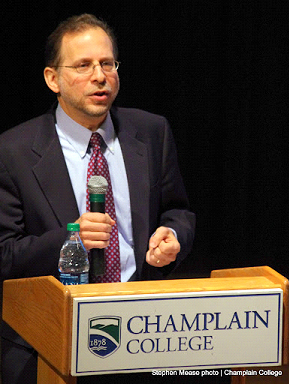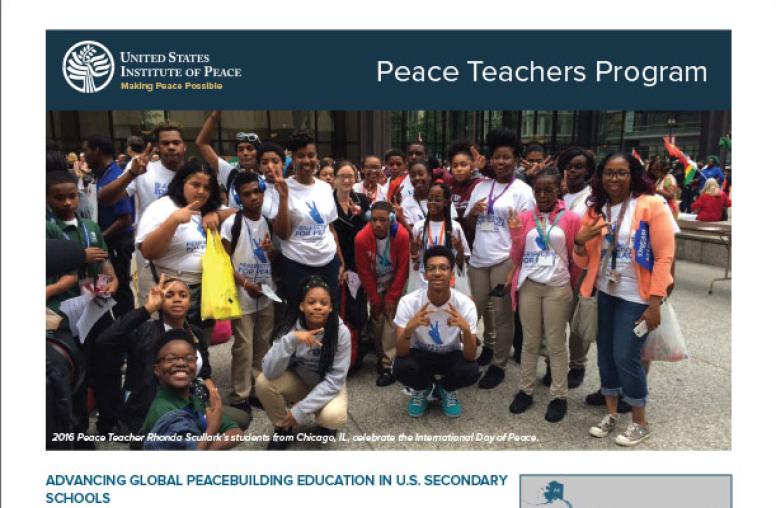Vermont: A Model Peacebuilding State
In an age of international conflict and crisis, active peacebuilding is underway in America to advance national security and find alternatives to violence around the world. That includes Vermont, where last week USIP’s Special Assistant to the President for Grants and Middle East specialist Steve Riskin led the USIP New England Regional Grants Development Workshop and a public discussion on developments in the Middle East.

In an age of international conflict and crisis, active peacebuilding is underway in America to advance national security and find alternatives to violence around the world. That includes Vermont, where last week USIP’s Special Assistant to the President for Grants and Middle East specialist Steve Riskin led the USIP New England Regional Grants Development Workshop and a public discussion on developments in the Middle East.
Riskin conducted the workshop and public discussion at Champlain College in Burlington. The events were a government-university partnership between USIP, Champlain College and the University of Vermont (UVM). Julian Portilla, director of the Masters in Mediation and Applied Conflict Studies at Champlain’s Woodbury Institute, co-hosted the event along with Saleem Ali, a former USIP grantee who now directs the Institute for Environmental Diplomacy and Security at UVM’s Jeffords Center for Policy Research.
Attendance at both events was strong, including faculty, students and representatives of nongovernmental organizations (NGOs) in the region. The director of Foundation and Corporate Relations in Champlain College’s Office of Advancement also participated in the grants development workshop, which covered the conception, development and presentation of project proposals.
Some 70 people attended the public discussion which focused on political transformations and peacebuilding efforts in the Middle East. John Tracy, state director for Senator Patrick Leahy (D-VT), attended the afternoon lecture and offered opening remarks. Tracy cited USIP in particular and broader conflict prevention and resolution efforts as increasingly important to national security after a decade of war in Iraq and Afghanistan.
Leahy, the state’s senior senator, has been an ardent supporter of the Institute and the field of international conflict management and peacebuilding from his position as chairman of the Senate Appropriations Subcommittee on State, Foreign Operations and Related Programs. In 1999, Senator Leahy delivered the keynote address to the state winners of the National Peace Essay Contest and has hosted the Vermont essay contest winners for more than 15 years in meetings at the Capitol.
Senator Leahy has consistently backed USIP and its role in helping sustain America’s global leadership, urging Congress in the fiscal year 2011 federal budget debates to show they are serious about preventing international conflict by protecting the small agency’s $39 million budget. Leahy cautioned:
“This funds conflict resolution and peacebuilding, including in Iraq, and has been supported by Republicans and Democrats since Congress first established it. I ask unanimous consent that an op-ed by Gen. Anthony Zinni about USIP in the March 8 New York Times, entitled ‘‘Peace-building that Pays Off,’’ be printed in the [Congressional] Record after my remarks.”
 Vermont’s roots are found in several USIP senior staff, including Director of Congressional Relations Laurie Schultz Heim who served as senior policy adviser to Congressman and then Senator Jim Jeffords (1983-2006); and Beth Cole, dean of Institutional Affairs for USIP’s Academy for International Conflict Management and Peacebuilding.
Vermont’s roots are found in several USIP senior staff, including Director of Congressional Relations Laurie Schultz Heim who served as senior policy adviser to Congressman and then Senator Jim Jeffords (1983-2006); and Beth Cole, dean of Institutional Affairs for USIP’s Academy for International Conflict Management and Peacebuilding.
Additionally, Vermont’s former Lieutenant Governor Barbara Snelling served on the USIP board of directors from 2001 to 2007. A leader in education policy and a Republican supporter of constructive international engagement, Snelling oversaw the Institute’s evolution into an on-the-ground provider of conflict mediation and resolution.
The Vermont delegation played a leadership role in the Institute’s creation in the early 1980’s. Leahy was an original cosponsor in 1981 of legislation to create the Institute, then known as the Peace Academy, and in the House, Jeffords was an original Republican cosponsor. Vermont’s Senator Robert Stafford chaired the Senate subcommittee that crafted the USIP Act. A Republican and a believer in the importance of America’s role as a peacemaker, Stafford guided the legislation through a divisive committee process that led to a strong blueprint for the Institute. This bipartisan coalition was critical to effort that culminated in the Institute’s inclusion in the 1984 defense authorization act that was signed into law by President Ronald Reagan.
Explore Further
- Virginia: At the Crossroads of Building Peace
News Feature by Tara Sonenshine



